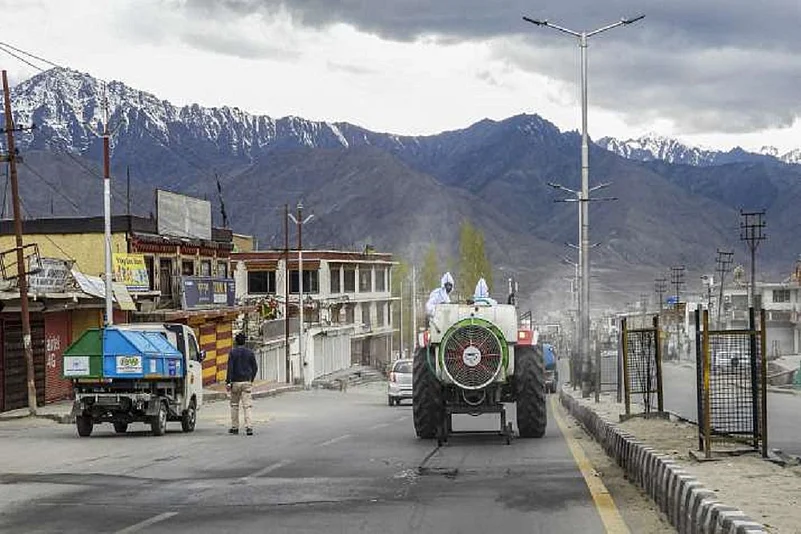In a major development, the government of the Union Territory of Ladakh issued an order Saturday defining ‘resident of the UT of Ladakh.”
According to the Ladakh Resident Certificate Order 2021, any person who possesses a Permanent Resident Certificate issued by the competent authority in the districts of Leh and Kargil or belongs to a category of persons who would have been eligible to be issued Permanent Resident Certificate by the competent authority in the districts of Leh and Kargil will be eligible to receive the Resident Certificate.
In contrast to Jammu and Kashmir where the government has come up with domicile law making it easy to acquire a domicile certificate of J&K for outsiders, in Ladakh the government has stuck to the old rules.
“It is a step towards retaining Permanent Resident Certificate of erstwhile State of J&K in Ladakh,” says Kargil Democratic Alliance co-chairman Asgar Ali Karbali. “The government by this order has realised that Permanent Resident Certificate is a baseline for issuing the Resident Certificate for the Ladakh for jobs and acquiring land. We welcome this realisation,” Karbali told Outlook.
According to the officials, the administration of Union territory of Ladakh issued an order to temporarily define ‘Resident of Union territory of Ladakh’ for the purpose of appointment to all the non-gazetted posts borne on the establishment of any Department or service of Administration of Union territory of Ladakh. The order says children of persons possessing a Permanent Resident Certificate or children of persons who belonged to a category of persons who would have been eligible to be issued Permanent Resident Certificate by the competent authority in the districts of Leh and Kargil will also be eligible to receive the Resident Certificate.
The provisions of this order authorise the Tehsildar or any other officer notified by the Administration as the competent authority to issue the Resident Certificate.
After the abrogation of Article 370 on August 5, 2019, the government has extended 890 central laws to Jammu and Kashmir and 130 state laws of the erstwhile state of J&K have applied to J&K after modifications. However, at the same time the BJP government in the Centre hasn’t extended any central law to Ladakh or adapted any law from erstwhile J&K state to Ladakh.
Early this year the Union Territory government of Ladakh sought applications for jobs for residents of Ladakh without having any law that defines a resident of Ladakh. The Resident Certificate Order 2021 is a move to define the resident of Ladakh as political parties in Ladakh have been saying they will not accept domicile law on the pattern of J&K.
In the absence of any law extended or adapted in Ladakh there is the widespread assumption in the region that previous law of erstwhile State of Jammu and Kashmir are still applicable in Ladakh.
In J&K the government has taken an altogether different approach. On March 31, 2020, the Centre government notified a law through an executive order defining domicile of Jammu and Kashmir and eligibility for employment in government jobs. Under the law, the domiciles have been defined as those who have resided for a period of 15 years in the Union territory of Jammu and Kashmir or have studied for a period of seven years and appeared in Class 10th, 12th examination in an educational institution located in J&K.
Later, on October 27, 2020 the Centre government notified Jammu and Kashmir Reorganization (Adaptation of Central Laws) Third Order, doing away with domicile or permanent resident certificate to purchase land in Jammu and Kashmir. On June 1, this year, the government of J&K further widened the scope of domicile certificate as it said it will be giving domicile certificate to the spouses of persons having J&K’s domicile certificate. The move allows husbands of J&K women married outside to acquire the documents for the first time.
Before August 5, 2019, when Article 370 and Article 35A of Indian constitution were in vogue in J&K and Ladakh, all jobs in the erstwhile state of J&K including Ladakh were exclusively reserved for permanent residents of the State. Under Article 370 Jammu and Kashmir had separate constitution called constitution of Jammu and Kashmir while the Article 35A was prohibiting people from outside from buying property in Jammu and Kashmir and ensuring job reservation for permanent residents. Article 35A would empower the Government of J&K to define a class of persons as constituting “permanent residents” of the erstwhile State and allow the government to confer on them special rights and privileges with respect to matters of public employment and acquisition of immovable property in the State. Annulled Article 35-A was included into the Constitution of India in 1954 by a presidential order made under Article 370 of the Constitution of India.


























